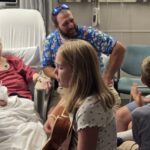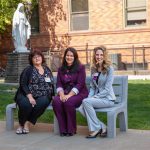When her mother was battling a serious illness, Louise Kline saw firsthand the compassion and care that hospice volunteers brought to their work. So in 2011, she made the decision to become a volunteer herself.
Kline works with Community Nursing Hospice Care, part of UPMC Visiting Nurses Association. To mark Hospice and Palliative Care Awareness Month, we asked Kline about her experiences as a hospice volunteer and why the work is so meaningful to her.
Q: What does volunteering for hospice consist of?
A: Whenever an individual in hospice care or a family member requests a volunteer, I get a call. In my role as a volunteer, I visit patients for companionship, make bereavement contacts and phone calls to surviving family members, and send cards on holidays and dates that are important to families. After a family member has passed away, I make sure to reach out once a month for 13 months, to check in and let them know that I’m thinking of them, and to offer companionship if they need someone to talk to.
When I go to the patient’s home and spend time with them, this allows the caregiver to leave and go grocery shopping or do other errands. Hospice care is not just for the patient, it is for the family member, too. Being a caregiver can be an incredibly stressful time, and everyone needs a break once in a while. Sometimes I’ll spend time talking to the family member who is caring for the patient, as it’s helpful to have a third party to talk to, and someone who has been through it all before. And sometimes, I’ll fix up the patient’s hair, as I did for one local woman when I visited her.
Q: What is your own personal story with hospice care?
A: My mother was sick with Alzheimer’s for many years but the last three years before she died was when she needed a lot of intense care. My brother and I were the primary caregivers, and we needed to provide constant monitoring and care, and to walk with her and make sure she didn’t fall. It was very stressful and especially for me as the oldest daughter; to see my mother go downhill was really tough. In speaking with a friend one day, she suggested I contact hospice as it had really helped her.
So I did, and we had nurses who specialize in pain management and social workers come to our house, and I realized that in many ways the care was more for me than for my mother, who wasn’t doing much walking at this point. The caregivers helped with bathing, and took away some of the burden of daily care – they made everything a little bit easier.
Then, when we brought my mom to Florida for a vacation, we discovered a hospice volunteer program in Fort Myers. The volunteer came to the house and that allowed us to have a few hours of free time on Friday afternoons. It was a tremendous help for us.
After we got back from Florida and after my mother passed away, I saw a notice on our church bulletin about Community Nursing Hospice Care needing volunteers. I signed up immediately and after completing my training, I began volunteering.
Q: What did you think hospice was before your experience, and how has your perception changed?
A: I didn’t know about all of the aspects that are involved in hospice care – most people still think hospice is a last resort before someone dies, but it can involve so much more. Being able to talk to a social worker about care, or having someone to help with bathing can be a huge weight lifted for families. The social worker relationship was so important to us – she helped us think through tough situations, and suggested we have our funeral arrangements pre-planned ahead of time, before my mom passed away. This was a really tough conversation but hugely helpful.
Hospice isn’t just for cancer, too – it is also for Alzheimer’s, heart conditions and other terminal conditions.
I’ve also become close friends with some of the families, as you develop a close relationship with people when the patient is sleeping. When I’m able to help out, I feel better myself – I feel appreciated and the whole experience of volunteering is very rewarding.
Community Nursing Hospice Care goes into homes, nursing homes, or personal care homes towards the end of life, and focus on patient and family care. The goal is to maintain people in their homes, wherever it is that they call home. Services include, but are not limited to: skilled nursing, home care aid, spiritual care, and bereavement counseling.









